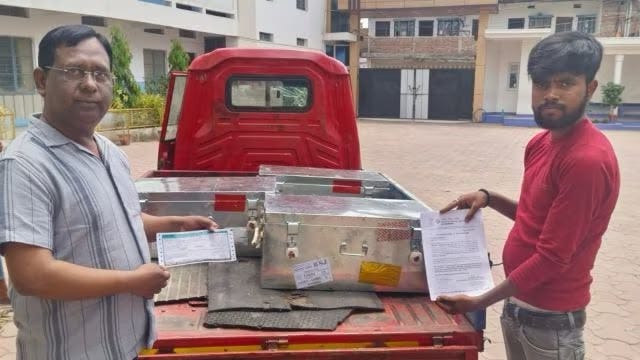Managing Paper Leaks Without Internet Shutdowns: Short-Term and Long-Term Solutions
Shutting the internet down for entire districts or states is not the answer; here are some alternate solutions
Internet shutdown is a hassle for everyone, from institutions to individuals, with high political, economic, and social costs. Thus taking a stance against internet shutdowns for examinations is important. Especially since there are viable—and less invasive—short term (using jammers) and long term measures (changing testing methods) to curb this problem.
The Key Problem: Paper Leaks
The average Indian youth lives and breathes examinations. At minimum, a student gives two board exams during school years, followed by at least one entrance test for their undergraduate degree. After that, given their career choices, some partake in several recruitment examinations - held for different functions and levels of government. While others prepare for a post-graduate degree (or further), another path laden with entrance exams. A student is almost always preparing. This leads to a very high concentration of human capital investment.
Add to that the high expenditure such exams necessitate and it becomes clear how disruptive paper leaks can be to the education ecosystem. Thus, the smooth conduction of such examinations is of prime importance; they form the backbone of governmental recruitment and higher education admission. It is then highly concerning that between 2019 and 2024, 65 exams were leaked, of which 5 were pan-India examinations.
Re-doing such exams—given their scale—is rarely feasible economically, let alone politically or socially. These leaks cause civil unrest, lead to disruption of public order, and create distrust in government bodies.
Further, there is a correlation between question paper leaks and a decrease in academic motivation and psycho-social well-being of the examinee. This is troubling and can lead to long term implications on the wellness and the productivity of the upcoming workforce of the country.
Thus, it is necessary to use an admixture of swift short-term measures and effective long-term reforms to systematically unroot these problems at scale.

The Current Solution: Internet Shutdowns
Paper leaks, given their nature, occur on a very short timeline and lead to an acute crisis. When they occur, they need to be dealt with immediately. This leads states to utilise extreme preventative measures. This has taken form in internet shutdowns.
These internet shutdowns can vary in terms of duration and their extensiveness. While some states initiate a shutdown only during the duration of the examination, some states suspend the internet from the morning itself. Another thing to note is that exams often run for days and the shutdown lasts throughout that duration. The other dimension to suspensions is the extent of shutdowns, as some states only suspend mobile internet, while others take broadband services down too.
While the shutdown of mobile services may seem comparatively lenient, the impact is still far reaching. As stated in the Let The Net Work 2.0: Internet Shutdowns in India 2023-2024 report by SFIL and Internet Shutdown Tracker, ‘nearly 95% of internet users rely on mobile networks to access the internet’. Even if we account for people having both mobile and broadband services, this still leaves a significant portion of the population completely in the dark.
Currently, numerous state governments shut the internet down before and during examinations to prevent leaks and ensure fairness. However, this measure is not proportional to the issue—a notion concurred by the Supreme Court—and brings with it several drawbacks.
Why Be Concerned?
The central issue here is proportionality. Very simply, the method used to deal with a problem should be tantamount to the probable impact of problem. While exam leaks are highly disruptive, there are more effective measures to deal with them. On the other hand, Internet shutdowns are radical, illiberal, and highly disruptive. They have a major impact on both daily operations and emergency services.
An internet shutdown brings a hefty economic setback, quantified at $186,332 an hour in 2017 for India. This is especially concerning given the tendency of northern states to resort to internet shutdowns for examinations given their comparatively weaker economic outputs. Coupled with social, political, and developmental costs, with the disruption of educational, health, and public delivery service systems, an internet shutdown should really be a last resort.
With the push of a Digital India by the government, a number of essential services have now been digitised. This creates several complexities leading to unintended consequences. These issues disproportionately impact the marginalised, remote workers, and the poor. Thus, finding proportional responses—both short and long-term—becomes critical.

What to Do Instead?
Given the nature of exam leaks we need to have a comprehensive approach. This includes preventative short-term measures to improve the security of current testing methods and long-term systematic reforms to shift to a more secure mode of testing.. Assuming that that there is a higher political salience due to the recent rise of paper leaks, we can employ several strategies to curb paper leaks.
To prevent paper leaks in the short term, a lot of immediate damage can be inhibited by using a combination of the following solutions -
Using jammers - By putting jammers inside test centres, we can inhibit a vast amount of leaks as they usually take place at the last minute. While this might have an initial high cost, these jammers can be sustained in a test centre for years.
Secure transportation - As was noted during the NEET-UG case, paper transmission still took place on archaic and highly insecure means of transportation, such as e-rickshaws. A shift to more secure means of transmission is necessary.
Encryption - As a lot of pen-paper exams still rely on physical delivery of exam papers to the centres, it would be prudent to send encrypted documents en route. This would ensure that a compromised document might still be unusable to the perpetrator. This method works equally well on computer-based examinations.
Integrity of the center - As a last measure, test centers can be sealed in front of both police and administration representatives, to be unsealed before the beginning of the exam. This would ensure that no tampering took place while making it easier to flag areas with issues. While more intensive, this measure can be employed at areas where prior paper leaks have taken place.

While these steps mitigate the chances of a paper leak happening, we need systematic reforms to ensure long-term viable solutions that also tackle the challenge posed by emerging technologies.
Such reforms can take the form of reformed institutions and changed modes of examination -
Reform NTA - At the Union level reforming NTA is a must and can provide best practices for state level transformation. The National Testing Agency, responsible for admissions and recruitment to all central universities, is overburdened. Test takers have increased from 67 lakhs to 1.22 crores in 4 years, while there has been no major institutional shift. This is not sustainable and reforms are necessary for the agency to acclimate to this shift in scale.
Digital Transmission - Transmitting question papers digitally mitigates interception as most paper leaks take place with the leaking of the physical document. Further, a digital transmission can be deferred much longer than physical transportation, this gives leakers significantly less time, especially if the paper is encrypted.
Tests need to shift to a hybrid adaptive multi-staged model.
Adaptive - There is a need to shift from the usual format of creating ‘sets’ of question papers to create a bigger question bank that can provide unique question papers for most candidates. This ensure the minimisation of impact if a question paper is compromised.
Multi-staged - Very simply, if the exams have more than one stage, then the impact of a leak on candidates is inhibited as there is more than one round. This ensures meritorious candidates clear all rounds while the perpetrator might still be held back.
Blockchain - Harnessing emerging technologies like blockchain can create significant security boosts. It ensures that the transmission of papers to centers cannot be intercepted, while providing secure encryption, easy auditability, and restricting access from unauthorized stakeholders. This can allow us to adopt adaptive testing by creating unique papers from an encrypted question bank for every examinee making such leaks redundant.
In Sum
Paper leaks are a significant problem in the country, with more than 65 leaks happening in 5 years. They cause significant disruptions in the education ecosystem with far reaching impacts. We must find alternative proportional measures to curb this matter. An internet shutdown is not the solution, it causes more problems than it mitigates.
As new technologies emerge, we face sophisticated challenges and are presented with tantamount opportunities. By tactical deployment of short-term measures and pursuing long-term systemic reforms, we can take a definite step forward from moving away from internet shutdowns towards using proportional and progressive leak prevention measures.
Read more :)
An amazing podcast episode by Ideas of India (by the Mercatus Center) with Kunal Mangal breaking down the motivation of youth chasing government jobs and the impact it has on the labour marker. Here is Kunal’s paper regarding the same topic.
A key unintended consequence - “No Internet Means No Work, No Pay, No Food”: Internet Shutdowns Deny Access to Basic Rights in “Digital India” by the Human Rights Watch.
Here is a report by the Radhakrishnan panel on reforming testing methods in India. Here is an article discussing about its recommendations.







Well done Sanyam! Nice, concise post, although I am concerned about the lack of investment in this sense. maybe we could stoke a sort of start-up culture in this sector, by organising hackathons and all?